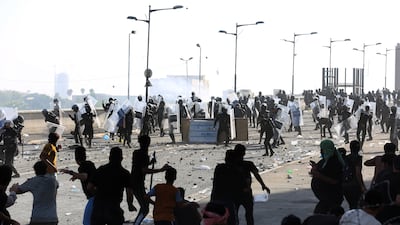Iraq is preparing for one of its biggest ever demonstrations on Saturday, with security being tightened around Baghdad's fortified Green Zone.
Supporters of powerful cleric Moqtada Al Sadr, known as Sadrists, as well as human rights advocates, journalists and civil society members are expected to take to the streets to vent their anger and frustration over the government's failure to respond to their basic needs.
Baghdad Operations Command denied that entrances to the capital had been shut before the planned protests.
“The Baghdad Operations Commander, Lt Gen Ahmed Salim, ordered the reopening of all closed bridges and roads, except for Al Sinak and Al Jumhuriya bridges,” the official Iraqi News Agency reported.
But since last week, security forces have been conducting training, part of which has included closing off roads into the capital.
The Sadrists are calling for fresh elections after nearly a year of deadlock in parliament over forming a new government.
Mr Al Sadr's party won a large portion of seats in parliament but failed to gain the necessary majority to form a government.
Since then, political jockeying has paralysed the country's government formation process.
Saturday's protest will also mark the third anniversary of the 2019 anti-government demonstrations to demand justice and an overhaul of the political system.
The 2019 demonstrations, part of what became known as the Tishreen movement, were met with violence and repression from security forces. At least 600 people were killed and thousands wounded.

On Wednesday, protesters clashed with anti-riot police during an attempt to storm the Green Zone.
The violence occurred as the Iraqi parliament was due to convene for the first time since the deadly unrest and a sit-in protest by supporters of Mr Al Sadr in August, when tension over politicians' inability to form a government reached a breaking point.
The protests led to street battles between demonstrators, security forces and militias allegedly backed by Iran.
At least 30 people, mostly Sadrists, were killed and 400 were injured in the violence that followed Mr Al Sadr's announcement that he was quitting politics.
Normal life has returned to Baghdad but the political stand-off continues.


